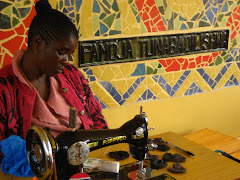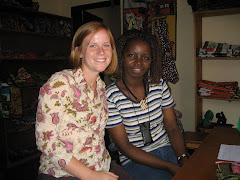It was a home visit on our last day with the ladies of Amahoro ava Hejuru in Kigali, Rwanda. We’d traveled across town by bus and then up a long, winding path to Florence’s home. There was a pretty little garden proudly displayed by the front door. Everyone wore her best dress.
After a quiet, somber meal, Theresa shared a word of encouragement from II Chronicles 20:4-6 about relying on God for strength when we know everything else will fail us. She inserted “Imana yacu ashimwe cyane” like periods at the end of each sentence. My Jesus be praised very much. These simple words uttered over and over by Theresa were later proclaimed by Vestine’s loud, strong singing; Beata’s decisively swaying head; Jane’s straight, cocked arms; and Rosemary’s firmly pounding feet. Children poked their heads in and were soon invited to join, their small feet learning the steps that will one day be second nature. The dancing kicked up dust that looked to me like incense rising.
After dancing.
I could ask for no better way to end our days with the Amahoro ladies in Rwanda. Much like in Burundi, our time with them revealed both deep personal and communal struggles, as well as an unwavering commitment to seeking God’s goodness—a reality not easy to hold in tension. Kiyarwanda is a beautiful language to listen to, but one not easy to pick up. We sat with them for daily prayers and devotions, relying on Grace’s translation to participate. Grace also helped facilitate a strategic planning session, lots of work on product revisions for export, and my efforts to gather stories to share from their work there. We took lunches together—a practice begun by the ladies in Rwanda and extending to other Amani centers.
It’s clear that these ten women are friends. They enjoy and know one another well. When business is slow or the iron breaks or the power goes out, they sit to talk and pray for one another. They show me the way to shoulder one another’s burdens. And their dancing teaches me something of celebration amidst the weight of suffering.
Tea, sugar, and a pile of work.
After a week in Rwanda, we bid the Amahoro ladies farewell and headed back to Kenya for one last brief stop. The Amani Kenya ladies welcomed us warmly, and I gave thanks that we could end our time with them. They sent us off with prayers for safety, wishes for our return, and hugs that dispel any doubt of lacking affection. We packed up all ten of our bags—six suitcases and four carry-ons—with products, gifts, and lots of dirty clothes. Leaving is always hard, but as Elizabeth told us at our farewell gathering:
“We are all one family. Even though you are going far away, we know that every day we are together. We are connected as one.”
This family is big, diverse, and widespread. But we are indeed interconnected. Our trip gave us opportunity to witness this reality first-hand and participate in the linking of Amani’s family in Kenya, Burundi, Rwanda, and the US. These visits are costly in time and money, but they reap tremendous benefit in building one another up in our specific callings.
Thank you for supporting this trip and the work of Amani in all of these places. May peace continue to spread in Africa, the US, and wherever you find yourself.





3 comments:
Beautiful! Thank you again for sharing your story and the stories of the ladies. I feel like I'm there with you! So glad you both are home. Looking forward to talking soon!! {{Hugs}}
河水永遠是相同的,可是每一剎那又都是新的。..................................................
生存乃是不斷地在內心與靈魂交戰;寫作是坐著審判自己。..................................................
Post a Comment